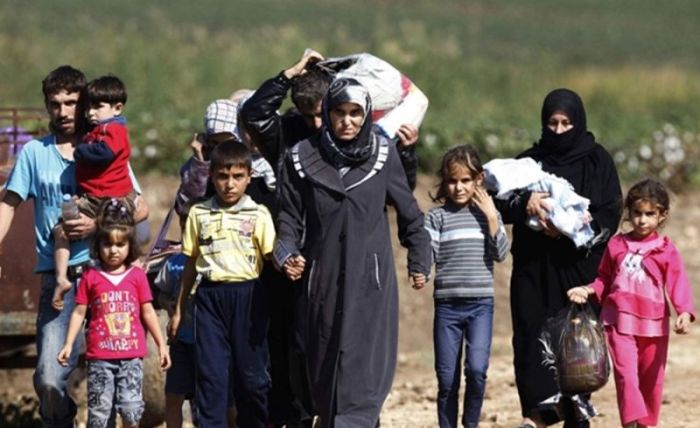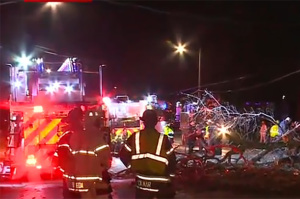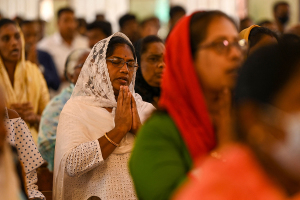Trump Considering Reducing US Refugee Cap By Over 40 Percent; Christian Groups React

Christian groups are speaking out after a report this week indicates that President Donald Trump is mulling a 40 percent cut to the already historically low limit on refugees being resettled to the United States.
The New York Times reported Wednesday that the White House is considering reducing the refugee resettlement cap for the next fiscal year, although the 45,000-refugee cap set by the president for fiscal year 2018 is already the lowest limit set by a president since the passing of the Refugee Act of 1980.
The newspaper cited two former government officials and a source familiar with the situation to state that the president is weighing one plan that would allow for no more than 25,000 refugees to be resettled in fiscal year 2019, which begins on Oct. 1.
Although a 25,000-refugee cap would signify a reduction of about 20,000 refugees from this year's limit, it appears that the administration won't even resettle 25,000 refugees in the current fiscal year. By comparison, the Obama administration resettled nearly 85,000 refugees in fiscal year 2016, the administration's last full fiscal year in office.
Matthew Soerens, the director of church mobilization at the refugee resettlement organization World Relief, the humanitarian arm of the National Association of Evangelicals, took to Twitter to voice his concern after reading The New York Times report.
"This year, for the first time in my lifetime at least, the US will no longer hold the title of the nation that resettles the most refugees," Soerens wrote. "We are on track for about 22,000 in 2018; Canada will almost certainly welcome more, though roughly one-tenth the size of the US."
As Soerens and World Relief have long spoken out about the Trump administration's refugee policy, he admitted in his tweet that he is "not sure what else to do." It should be noted that World Relief and other resettlement organizations have had to downsize and close offices in response to the administration's slowing of the refugee flow.
"I'm praying for @potus, who ultimately has the authority here, [and] for [Secretary of State Mike Pompeo], who has been outspoken in advocating for persecuted religious minorities [and] could override those under his leadership advocating further cuts to their resettlement," he continued.
Although the president's efforts to reduce the refugee cap for fiscal year 2018 were met with opposition within the administration, The New York Times notes that White House senior adviser Stephen Miller — a key figure behind the administration's immigration policies — has been successful when it comes to "installing allies in key positions who are ready to sign off on deep cuts."
Former Secretary of State Rex Tillerson and former acting Secretary of Homeland Security Elaine Duke, who were among the cabinet members who objected to Trump's immigration policies last year, have been replaced with Pompeo and Homeland Security Secretary Kirstjen Nielsen.
Although there is hope that the State Department will push back on a refugee resettlement cut, the sources warned the outlet that Pompeo is being advised by two senior aides who are close to Miller.
"In determining an appropriate refugee ceiling for 2019, the administration will consider the entire humanitarian caseload, legal and illegal — including asylum-seeking refugees, non-asylum seeking refugees and other categories such as special immigrant juveniles, unaccompanied alien minors, temporary protected status and other related programs," an unnamed White House official was quoted as saying.
The Christian Post reached out to both the State Department and Department of Homeland Security for comment on the report. A State Department spokesperson would only say that the president's determination on the refugee ceiling will be made prior to the start of the fiscal year. The Department of Homeland Security did not respond by press time.
Kay Bellor, vice president for programs at Lutheran Immigration and Refugee Service (LIRS), said in a statement that the reported reduction would come in the midst of the "worst global displacement crisis in history."
"[I]t would be simply unconscionable to further close our doors to refugees seeking freedom from persecution and violence," Bellor said. "This decision is about more than just a number. Right now the administration is weighing the lives of men, women, and children."
According to LIRS, a reduction to 25,000 refugees would reflect more than a 77 percent decrease to the U.S. refugee ceiling in just three years.
"For over a century this country has been a beacon of hope for persecuted individuals across the world," Bellor stated. "We are at our finest when we have acted on the ideals of freedom and hard work and welcomed refugees and asylum seekers. To see that legacy further undermined would be devastating to America and to those who look to us for global leadership."
Amnesty International, a left-leaning human rights organization and watchdog, argues that the plan to reduce the cap "betrays" the values of the United States.
"The Administration's policies are denying thousands of refugees a chance at a new life," Ryan Mace, grassroots advocacy and refugee specialist at Amnesty International USA, said in a statement. "Many refugees are also hoping to be reunified with their families here in the US — some of whom have waited years to see their family again."
"The Administration's policies continue to keep people in grave danger," Mace continued.
Last month, a bipartisan group of Congress members sent a letter to Pompeo and Nielsen demanding answers from the administration about the U.S. Refugee Admissions Program. The letter urged the administration to increase the pace of refugee arrivals for the remainder of the fiscal year in order to meet the cap of 45,000.
"Resettling refugees is a way that the United States can live out its core values and ensure a more stable and democratic world," the letter stated.
In June, prominent evangelical leaders like Russell Moore, Samuel Rodriguez and others affiliated with the Evangelical Immigration Table sent a letter to Trump speaking out about the low rate of refugee resettlement into the U.S. under his administration. The leaders complained that a low limit on refugee resettlement creates "fewer legal possibilities for those with a well-founded fear of persecution."
"The U.S. Refugee Resettlement Program has allowed many fleeing persecution in Central America and elsewhere to register as refugees abroad and be thoroughly vetted before coming lawfully to the U.S. However, with significantly fewer refugees being admitted in recent years, there are fewer options for those fleeing persecution," the letter states. "Those facing legitimate threats to their lives often feel they have no choice but to leave their countries and seek asylum elsewhere."
The news comes a week after the State Department hosted its first-ever Ministerial to Advance Religious Freedom in Washington, D.C.
At the conclusion of the three-day event, the administration launched initiatives and a plan of action that will guide other countries in promoting religious freedom and assisting persecuted religious minorities around the world. Initiatives include the formation of the U.S. Genocide Recovery and Persecution Response Program and the International Religious Freedom Fund.





























